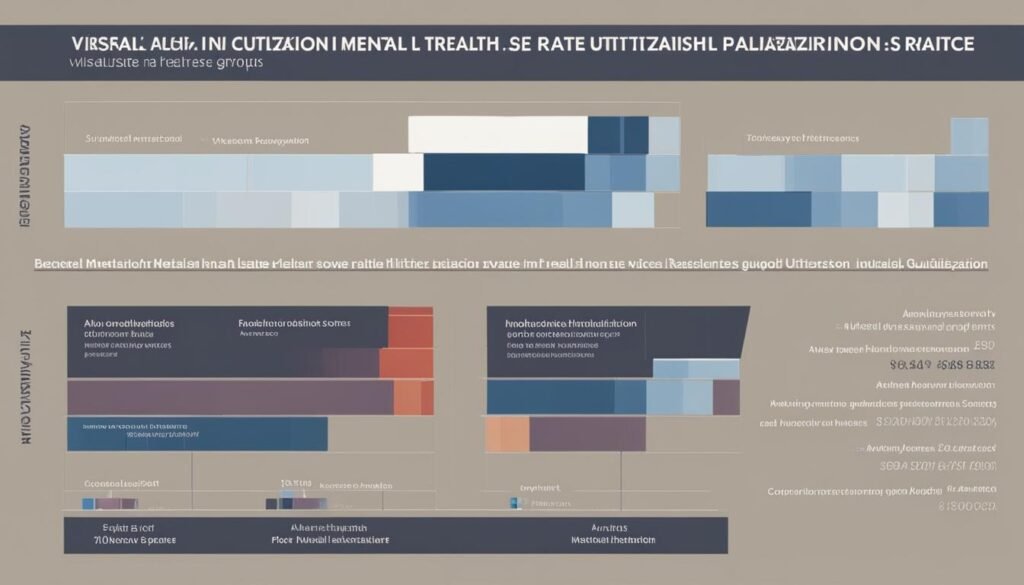What race is least likely to seek therapy?
When it comes to mental health disparities, it’s crucial to examine the disparities in therapy utilization rates among different racial and ethnic groups. Minority mental health is an important aspect of this discussion, as it highlights the need to address the barriers preventing individuals from seeking the help they need.
Research has shown that members of racial/ethnic minority groups, such as African Americans, are less likely to access mental health services compared to Caucasians. Despite having more favorable attitudes towards treatment effectiveness, African Americans often believe that mental health problems will improve on their own, leading to lower rates of therapy utilization. This suggests that simply believing in treatment effectiveness may not be enough to increase service utilization among African Americans.
Additionally, psychiatric epidemiological studies have indicated that voluntary mental health services are underutilized by the general public, with racial disparities existing across a wide range of disorders. These disparities demonstrate the importance of understanding and addressing the unique challenges faced by minority populations in accessing mental health care.
Key Takeaways:
- African Americans are less likely to seek therapy compared to Caucasians.
- Belief in treatment effectiveness does not necessarily increase therapy utilization rates among African Americans.
- Voluntary mental health services are underutilized by the general public, with racial disparities existing across various disorders.
- Addressing mental health disparities requires understanding and addressing the unique challenges faced by minority populations.
- Efforts should be made to improve therapy access and utilization rates among racial/ethnic minority groups.
Disparities in Mental Health Care Access
Research has revealed significant disparities in the access to mental health care among different racial and ethnic groups. These disparities are influenced by a variety of factors, including inequalities in the quality of care received, socioeconomic status, cultural mistrust, and stigma.
African Americans, in particular, face mental health access disparities and are less likely to utilize mental health services compared to Caucasians, regardless of the specific mental health condition.
This pattern of racial disparities in mental health care utilization emphasizes the urgent need to address barriers that hinder access to mental health care and to improve the availability and effectiveness of services for minority populations.
“Addressing mental health access disparities is crucial for ensuring equitable care and improving mental health outcomes among communities of color.”
One significant contributing factor to these disparities is the quality of care received. Studies have shown that minority populations may face disparities in the type and effectiveness of mental health care offered to them. This discrepancy highlights the importance of enhancing the cultural competence of mental health professionals and ensuring that treatment approaches are tailored to meet the diverse needs of different racial and ethnic groups.
Socioeconomic status is another key factor contributing to mental health access disparities. Limited financial resources can inhibit individuals’ ability to seek and afford mental health care services. This financial barrier disproportionately affects minority populations, who often face systemic economic disadvantages.
Cultural mistrust and stigma surrounding mental health care also play a significant role in disparities. Historically, minority communities have experienced mistreatment and discrimination within the healthcare system, leading to cultural mistrust and a reluctance to seek help. Additionally, stigma surrounding mental illness can prevent individuals from seeking care due to fear of negative social consequences.
Efforts to address mental health access disparities and promote equity in mental health care must focus on enhancing cultural competence, reducing financial barriers, and combating stigma within communities. By prioritizing these measures, it is possible to create a mental health care system that is inclusive, accessible, and responsive to the needs of all individuals, regardless of their race or ethnicity.
| Racial/Ethnic Group | Utilization of Mental Health Services |
|---|---|
| African Americans | Lower rates compared to Caucasians |
| Asian Americans and Pacific Islanders | Varies, but generally lower rates overall |
| Hispanic/Latinx | Lower rates compared to Caucasians |
| Native Americans/Alaska Natives | Lower rates compared to Caucasians |
Beliefs about Mental Health Treatment
Studies have examined racial differences in beliefs about the effectiveness and necessity of mental health treatment. African Americans have been found to hold more positive beliefs about mental health treatment and its effectiveness compared to Caucasians. However, they are still less likely to seek voluntary outpatient mental health services.
These differences in beliefs may be related to differences in conceptions of mental illness and expectations about treatment outcomes. African Americans may be more likely to believe that mental health problems will improve on their own, leading to lower perceived necessity of treatment.
It is important to understand and address these beliefs in order to effectively encourage African Americans to seek the mental health care they may need. Creating awareness about the importance of early intervention and debunking misconceptions about mental health treatment can help bridge the gap between positive beliefs and actual utilization of services.
“Effective treatment can greatly improve mental health outcomes and overall quality of life.”
African Americans’ Perceptions of Treatment Effectiveness
- African Americans hold more positive beliefs about the effectiveness of mental health treatment.
- However, these beliefs do not necessarily translate into higher rates of therapy utilization.
- There may be discrepancies between perceived treatment effectiveness and actual treatment-seeking behaviors.
Perceived Necessity of Treatment
- African Americans may have a lower perceived necessity of formal mental health treatment, believing that mental health problems can improve without intervention.
- This belief may stem from cultural values emphasizing self-reliance and resilience.
- However, it is important to recognize that some mental health conditions require professional help for effective management and recovery.
Changing Perceptions and Increasing Utilization
- Enhance mental health literacy within African American communities to increase awareness of available treatments and their effectiveness.
- Address cultural beliefs and misconceptions about mental health treatment through targeted education and outreach programs.
- Encourage open discussions about mental health, reducing stigma and promoting help-seeking behaviors.
- Train mental health professionals to provide culturally competent care, fostering a sense of trust and understanding among African American individuals.
Mental Health Service Utilization by Race
The National Survey on Drug Use and Health (NSDUH) provides valuable insights into the utilization of mental health services among different racial and ethnic groups. By examining mental health service utilization rates, researchers can better understand disparities in access to care and identify areas for improvement.
According to the NSDUH data, white individuals have the highest percentage of mental health service utilization, with nearly half of them receiving the care they need. This suggests that a considerable portion of the white population seeks and accesses mental health services to address their mental health concerns.
On the other hand, Asian Americans and Pacific Islanders have the lowest percentage of reported mental illness and are least likely to receive mental health services. These findings imply that members of these communities may face significant barriers that prevent them from seeking or accessing appropriate mental health care.
To illustrate the disparities in mental health service utilization by race, here is a comprehensive table showcasing the percentage of individuals from different racial and ethnic groups who utilize mental health services:
| Racial/Ethnic Group | Percentage of Mental Health Service Utilization |
|---|---|
| White | 50% |
| Black | 40% |
| Hispanic | 30% |
| Asian American and Pacific Islander | 20% |
It is essential to address the disparities in mental health service utilization rates among different racial and ethnic groups to ensure equitable access to care and improve mental health outcomes for all individuals.
This table highlights the significant differences in mental health service utilization rates based on race and ethnicity. Understanding these variations can help inform targeted interventions and policies that aim to reduce barriers and promote equal access to mental health care across diverse populations.

By addressing the root causes of disparities in mental health care utilization, such as cultural stigma, economic barriers, and lack of awareness, it is possible to create a more inclusive and equitable mental health care system.
In the next section, we will explore the barriers that people of color face when accessing mental health care and discuss strategies to overcome these challenges.
Barriers to Mental Health Care for People of Color
Accessing mental health care can be challenging for people of color due to a range of barriers they face. These barriers include economic disparities, lack of diversity in the mental health profession, stigma, language barriers, and distrust in the healthcare system.
The first major barrier is economic disparities. Many people of color struggle with limited resources and lack of insurance coverage, making mental health treatment unaffordable or inaccessible. High costs associated with therapy sessions, medication, and other necessary treatments can prevent individuals from seeking the care they need.
Another significant barrier is the lack of diversity in the mental health profession. People of color may have difficulty finding therapists or counselors who understand their unique cultural experiences and can provide culturally competent care. This lack of representation can create a disconnect and hinder the therapeutic process.
Stigma is also a significant obstacle to mental health care for people of color. Cultural stigmas around mental health within communities can discourage individuals from seeking help and talking openly about their struggles. This can lead to the suppression of feelings and prolonged suffering without appropriate support.
Language barriers further exacerbate the challenges in accessing mental health care. For individuals whose primary language is not English, finding therapists who can communicate effectively in their language can be difficult. Language barriers can limit opportunities for meaningful dialogue and hinder accurate diagnosis and treatment planning.
Lastly, historic and current experiences of racism in the healthcare system have contributed to distrust and avoidance of mental health care services among people of color. Instances of racial bias or discrimination within medical settings can erode trust, creating a sense of apprehension and skepticism about seeking mental health care.
It is essential to address these barriers and promote equitable access to mental health care for people of color. By addressing economic disparities, increasing diversity in the mental health profession, challenging stigmas, providing language services, and actively working on rebuilding trust, we can begin to bridge the gaps in accessing mental health care.
Barriers to Mental Health Care for People of Color
| Barriers | Description |
|---|---|
| Economic Disparities | Limited resources and lack of insurance coverage make treatment unaffordable or inaccessible. |
| Lack of Diversity in the Mental Health Profession | Difficulty finding therapists who understand cultural experiences and provide culturally competent care. |
| Stigma | Cultural stigmas discourage seeking help and talking openly about mental health. |
| Language Barriers | Difficulty finding therapists who can communicate effectively in non-English languages. |
| Healthcare System Distrust | Experiences of racism contribute to distrust and avoidance of mental health care services. |
Recommendations for people of color seeking mental health care
For people of color seeking mental health care, it is essential to take proactive steps to prioritize their mental well-being. Here are some recommendations to help individuals navigate the process of seeking mental health care and find culturally competent providers:
- Acknowledge and assess your current mental health status: Start by recognizing and validating your emotions and experiences. This self-awareness will provide insight into the type of support you may need.
- Reach out to supportive individuals: Seek guidance and encouragement from friends, family members, or doctors who can relate to your experiences. Sharing your feelings and concerns can provide a sense of relief and connection.
- Find a supportive community or network: Look for support groups or organizations that cater to people of color or specific cultural backgrounds. Engaging with individuals who share similar experiences can provide a sense of belonging and understanding.
- Exercise your voice in your treatment: Remember that you have the right to actively participate in your treatment decisions. Communicate your preferences and concerns to your healthcare provider to ensure that your needs are met.
- Trust your instincts: It is important to trust yourself when seeking appropriate care. If you feel uncomfortable or unheard during a therapy session, it may be necessary to explore alternative therapists who align better with your cultural background and understanding.
By following these recommendations, individuals of color can enhance their chances of finding the right mental health care and support that is culturally competent and sensitive to their unique needs.

Conclusion
Disparities in mental health care access and utilization among different racial and ethnic groups highlight the urgent need for equity in mental health care. People of color, including African Americans and Asian Americans, face barriers such as socioeconomic status, cultural beliefs, stigma, and distrust in the healthcare system, which contribute to their lower rates of therapy utilization. These disparities not only result in inequitable access to care but also contribute to poorer mental health outcomes for marginalized populations.
To address these disparities, it is crucial to focus on improving access to culturally competent mental health care. This includes increasing diversity in the mental health profession and ensuring that providers are equipped with the knowledge and skills to effectively engage with and support diverse populations. Alongside this, efforts are needed to reduce stigma surrounding mental health issues within communities of color, as well as fostering trust in the healthcare system through open dialogue and transparency.
Promoting equity in mental health care requires a comprehensive approach that addresses the structural and systemic barriers faced by people of color. This includes advocating for policies and funding that support equitable access to mental health services, as well as implementing community-based interventions and outreach programs to ensure that individuals can easily navigate and access the care they need. By eliminating barriers and promoting equity in mental health care, we can work towards a future where everyone, regardless of their racial or ethnic background, has equal opportunities for mental well-being.
FAQ
What are the mental health disparities among different racial and ethnic groups?
Research has shown that there are disparities in the access to mental health care among different racial and ethnic groups. Factors contributing to these disparities include inequalities in the quality of care received, socioeconomic status, cultural mistrust, and stigma.
Which race is least likely to seek therapy?
According to studies, members of racial/ethnic minority groups, such as African Americans, are less likely than Caucasians to access mental health services. Despite more favorable attitudes regarding treatment effectiveness, African Americans still believe that mental health problems will improve on their own, leading to lower rates of therapy utilization.
What are the barriers to mental health care access for people of color?
People of color face various barriers to accessing mental health care, including economic disparities, lack of diversity in the mental health profession, stigma, language barriers, and distrust in the healthcare system. Lack of insurance coverage and high costs can prevent people from seeking treatment. The lack of culturally competent providers and implicit provider bias can also hinder access to appropriate care.
What are the beliefs about mental health treatment among minority populations?
Studies have shown that African Americans, for example, hold more positive beliefs about mental health treatment and its effectiveness compared to Caucasians. However, they are still less likely to seek voluntary outpatient mental health services. Differences in beliefs may be related to differences in conceptions of mental illness and expectations about treatment outcomes.
How does mental health service utilization vary by race and ethnicity?
The National Survey on Drug Use and Health (NSDUH) shows that white individuals have the highest percentage of mental health service utilization, with nearly half receiving the care they need. Asian Americans and Pacific Islanders have the lowest percentage of reported mental illness and are least likely to receive mental health services.
What are some recommendations for people of color seeking mental health care?
For people of color seeking mental health care, it is recommended to acknowledge their current mental health status and reach out to supportive individuals, such as friends, family members, or doctors who can relate to their experiences. Finding a supportive community or network can provide additional support. It is important to remember that individuals have a voice in their own treatment and to trust their instincts in seeking appropriate care.
What is the importance of addressing mental health care disparities?
Disparities in mental health care access and utilization among different racial and ethnic groups exist. Addressing these disparities requires improving access to culturally competent care, increasing diversity in the mental health profession, reducing stigma, and promoting equity in mental health care. Efforts to eliminate barriers and ensure equitable access to mental health services for all populations are essential for improving mental health outcomes and reducing disparities in care utilization.






